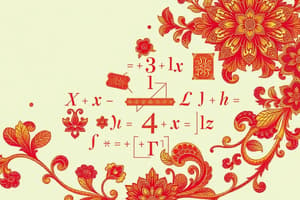Podcast
Questions and Answers
What does algebra serve as between numbers and expressions?
What does algebra serve as between numbers and expressions?
- A wall
- A barrier
- A bridge (correct)
- A tunnel
Why can algebra be challenging for some students?
Why can algebra be challenging for some students?
- Due to the lack of arithmetic skills (correct)
- Due to its simplicity
- Due to its few topics
- Due to its focus on whole numbers
Which course introduces more complex functions, including logarithms and trigonometric functions?
Which course introduces more complex functions, including logarithms and trigonometric functions?
- Algebra 1
- Algebra 2 (correct)
- Calculus
- Geometry
What type of functions does Algebra 2 typically include?
What type of functions does Algebra 2 typically include?
Which math skills are crucial for gaining confidence in an algebra course?
Which math skills are crucial for gaining confidence in an algebra course?
What is the purpose of factoring a polynomial in algebra?
What is the purpose of factoring a polynomial in algebra?
What is algebra primarily concerned with?
What is algebra primarily concerned with?
Which of the following is NOT a typical topic covered in Algebra 1?
Which of the following is NOT a typical topic covered in Algebra 1?
When is Algebra 1 typically introduced in the educational system?
When is Algebra 1 typically introduced in the educational system?
What is the primary purpose of using variables in algebra?
What is the primary purpose of using variables in algebra?
Which of the following statements about algebra is NOT true?
Which of the following statements about algebra is NOT true?
What is the primary goal of studying algebra?
What is the primary goal of studying algebra?
Study Notes
Algebra: Bridges between Numbers and Expressions
Algebra is a branch of mathematics that deals with the manipulation of symbols and expressions, often involving the use of variables to represent unknowns. It is a fundamental tool in mathematical problem-solving, enabling us to express complex relationships in simple terms. Algebra is typically introduced in high school and further advanced in college. It is a vast field with various subtopics, and one of the most critical subtopics is algebra itself.
Introduction to Algebra
Algebra is a high school math course that focuses on how to use letters (called variables) and numbers with mathematical symbols to solve problems. It includes evaluating expressions, writing equations, graphing functions, solving quadratics, and understanding inequalities. Algebra 1 is typically taught late in middle school or early in high school, with the course structured to build on the conceptual understanding and procedural fluency of middle school math topics.
Algebra 1 Topics and Concepts
Algebra 1 covers a range of topics, including polynomial operations, interpreting expression structure, factorization procedures, factoring polynomials, understanding systems of equations, solving systems of equations, systems of inequalities, piecewise functions, absolute value and step functions, function transformations, exploring quadratic functions, factored form, vertex form, representing data, one-variable statistics, variation, standard deviation, two-way tables, and scatter plots.
Algebra as a Bridge between Numbers and Expressions
Algebra serves as a bridge between numbers and expressions, allowing us to express complex problems in simple equations. It is a powerful tool that allows us to solve problems involving unknowns, such as finding the value of a variable in an equation or determining the equation of a line that passes through two points. Algebra also allows us to manipulate expressions, such as factoring a polynomial or simplifying an expression, to make it easier to work with.
Is Algebra Hard?
The difficulty of algebra depends on the individual. Students with a strong background in middle school math topics, such as fractions, decimals, ratios, percents, and negative numbers, may find algebra relatively accessible. However, for many students, algebra can be challenging due to the numerous topics and skills that build on each other as the curriculum progresses. Strong arithmetic skills are crucial for gaining confidence in an algebra course.
Algebra 1 vs. Algebra 2
Both Algebra 1 and Algebra 2 involve the use of variables and functions, but Algebra 2 is an advanced expansion of the ideas from Algebra 1. Algebra 2 introduces more complex functions, including logarithms, radicals, and rational functions, and often includes trigonometric functions. Algebra 2 typically includes solutions with real and complex numbers, as well as parabolas, ellipses, and more sophisticated mathematical concepts.
In conclusion, algebra is a fundamental part of mathematics that bridges the gap between numbers and expressions. It is introduced in high school and builds on the foundational math skills learned in middle school. Algebra 1 covers a wide range of topics, preparing students for more advanced mathematical concepts in Algebra 2.
Studying That Suits You
Use AI to generate personalized quizzes and flashcards to suit your learning preferences.
Description
Explore the fundamental concepts of algebra, which serves as a bridge between numbers and expressions. Learn about Algebra 1 topics and concepts, including polynomial operations, systems of equations, quadratic functions, and more. Understand the differences between Algebra 1 and Algebra 2, with Algebra 2 delving into more advanced functions and mathematical concepts.




